Recently Viewed:
Home > Event 2011
Event 2011
Project Result
A Distant Mirror: Articulating Indic Ideas in Sixth and Seventh Century Chinese Buddhism Chen-kuo Lin and Michael Radich (eds.), Hamburg University Press, 2014. 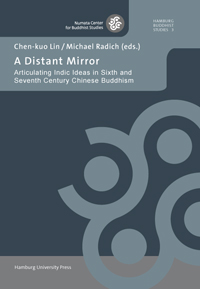 In this book, an international team of fourteen scholars investigates the Chinese reception of Indian Buddhist ideas, especially in the sixth and seventh centuries. Topics include Buddhist logic and epistemology (pramāṇa, yinming); commentaries on Indian Buddhist texts; Chinese readings of systems as diverse as Madhyamaka, Yogācāra and tathāgatagarbha; the working out of Indian concepts and problematics in new Chinese works; and previously under-studied Chinese evidence for developments in India. The authors aim to consider the ways that these Chinese materials might furnish evidence of broader Buddhist trends, thereby problematizing a prevalent notion of “sinification”, which has led scholars to consider such materials predominantly in terms of trends ostensibly distinctive to China. The volume also tries to go beyond seeing sixth- and seventh-century China primarily as the age of the formation and establishment of the Chinese Buddhist “schools”. The authors attempt to view the ideas under study on their own terms, as valid Buddhist ideas engendered in a rich, “liminal” space of interchange between two large traditions. In this book, an international team of fourteen scholars investigates the Chinese reception of Indian Buddhist ideas, especially in the sixth and seventh centuries. Topics include Buddhist logic and epistemology (pramāṇa, yinming); commentaries on Indian Buddhist texts; Chinese readings of systems as diverse as Madhyamaka, Yogācāra and tathāgatagarbha; the working out of Indian concepts and problematics in new Chinese works; and previously under-studied Chinese evidence for developments in India. The authors aim to consider the ways that these Chinese materials might furnish evidence of broader Buddhist trends, thereby problematizing a prevalent notion of “sinification”, which has led scholars to consider such materials predominantly in terms of trends ostensibly distinctive to China. The volume also tries to go beyond seeing sixth- and seventh-century China primarily as the age of the formation and establishment of the Chinese Buddhist “schools”. The authors attempt to view the ideas under study on their own terms, as valid Buddhist ideas engendered in a rich, “liminal” space of interchange between two large traditions.For more info and free full-text: click here Lecture
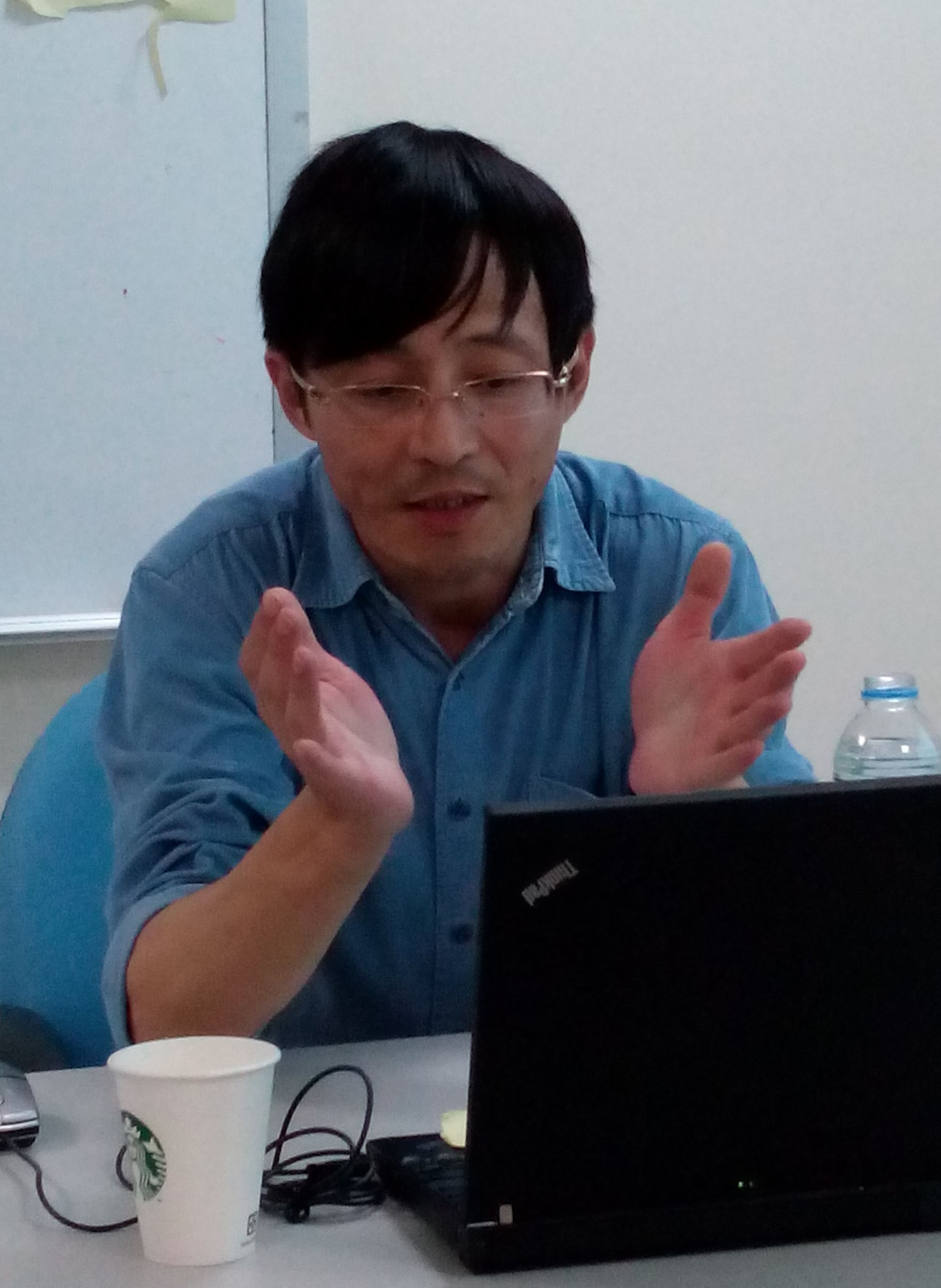 從“勝軍比量”到“唯識比量”—— 玄奘對簡別語“自許”的使用 傅新毅教授 南京大學哲學系 時間:2014年11月28日(五)上午 10:30 – 12:30 地點:政治大學山上校區 百年樓 哲學系330227室 Abstract演講摘要: 按照因明作法的通則,對於共比量,除宗體外,其餘宗依、因、喻等都必須共許極成,否則就會犯“不極成”的過失。不過,我們可以通過簡別來避免過失,“若自比量,以許言簡,顯自許之,無他隨一等過。若他比量,汝執等言簡,無違宗等失。……隨其所應,各有標簡。”而一旦作出這樣的簡別,它也就成了自比量或他比量,而不再是共比量。 然而,玄奘在他所作的兩個典範性的因明量式“勝軍比量”與“唯識比量”中,都使用了簡別語“自許”,而奘門後學一般都視其為共比量。那麼,“自許”的簡別是否可以出現在共比量中呢?這與自比量中“自許”的簡別又有何區別呢? 早在上世紀二十年代,呂澂先生在《因明綱要》中就已提出了一個非常重要的看法:“以是因上簡言實有二類,或簡其為宗法,或簡其法自體。諸論但明初門,理准應有後義。”筆者以為,呂先生的這一說法總體是能夠成立的,雖然在某些具體問題上亦有可商榷之處,本文即以“勝軍比量”與“唯識比量”為例來說明這一點。 Lecture
 Abhidharma and Buddhist Ontology Prof. Bart Dessein Department of Languages and Cultures of South and East Asia, Ghent University 時間:2014年10月27日(一)下午 4 - 6 時 地點:政治大學山上校區 百年樓 哲學系圖書室 Professor Bart Dessein will talk about how Abhidharma developed as a genre and how the systematization of the doctrine also led to philosophical developments, related to, among others, causation, ontological questions, etc. Lecture
 Momentary Dharmas, Momentary Persons: Kuiji's窺基 Arguments for Non-Self Ernest Billings (Billy) Brewster (Harvard University) 時間:2014年6月13日(五)上午 11AM 地點:政治大學山上校區 百年樓 哲學系330227室 Abstract演講摘要: The existence or non-existence of persons was the cardinal issue in dispute within the rationalistic tradition of Buddhist-Brāhmaṇical debate. Historically, Xuánzàng’s 玄奘(602-664Treatise Proving Consciousness-Only (* Vijñaptimātrasiddhi-śāstra; Cheng weishi lun《成唯識論》) is of considerable importance because it contains crucial early materials documenting the Buddhist-Brāhmaṇical debate up to the 7th century, an important period which is under-documented in the available Sanskrit sources. The only direct commentaries on the Cheng weishi lun by Xuanzang’s disciple, Kuījī 窺基(632-682 C.E.), are also of considerable historical interest in that they contain a wealth of material on the arguments of the Sāṅkhya (數論), Vaiśeṣika(衛世; 勝論; 吠世史迦) Jaina, and Śaiva (i.e., Paśupata 獸主and Parivrājaka 波利呾羅拘迦) interlocutors (pūrvapakṣins) represented in the Cheng weishi lun. Philosophically, Kuījī’s Recorded Explanations on the Treatise Proving Consciousness Only (Vijñaptimātra-siddhi-śāstra)《成唯識論述記》and Essentials of the Treatise Proving Consciousness-Only in the Palm of the Hand《成唯識論掌中樞要》are of particular interest in that his arguments against these views of Self are constructed in the form of formal inferences, composed of subject-locus (pakṣa), reason (hetu), and example (dṛṣṭānta). In this paper, I investigate Kuiji’s exegesis on the first section of the Cheng weishi lun in order to clarify a number of puzzling passages dealing with the diverse doctrinal theories of the rival traditions. 2014 NCCU-KU-YaleNUS Workshop in Asian Philosophy
Date: March 07-08, 2014 Venue: National Chengchi University, Taipei Mar 7 (Friday) 09:00-09:10 Welcoming Address LIN Yuan-tse, Chair, Department of Philosophy, NCCU 09:10-10:00 Jay Garfield Just Another Word for Nothing Left to Lose: Freedom, Agency and Ethics for Mādhyamikas 10:00-10:50 DEGUCHI Yasuo The Logic of Provision: Sānlùn Meets Non-classical Logic 11:10-12:00 LIN Chen-kuo Self-Illumination and Dualistic Illumination: Two Modes of Cognition in Sixth-Century Chinese Buddhist Epistemology 14:00-15:30 FUJIKAWA Naoya Nothingness and Its Form: From a View Point of Paraconsistent Mereology TSAI Miao-kun Moral Persuasion in Ancient China Jakub Zamorski “Transformation of Consciousness” as Salvation by “Other-Power”: Buddha Amitābha and Bodhisattva Dharmākara in Shen Shandeng’s (c.a. 1830-1901) Bao’en lun. 15:50-17:20 Philippe Major Transcendental Authority in Early Chan and Modern Academia IIZUKA Hajime K. C. Bhattacharyya’s Concept of the Subject as Knowable but Unthinkable LIN Su-an Two Truths and Logic in Bhāviveka's Madhyamaka Philosophy Mar 8 (Saturday) 09:00-09:50 KENG Ching Two Truths without AN ultimate reality? –A reappraisal of Garfield and Siderits’ Interpretation 09:50-10:40 WANG Hua The Path toward Sagehood: Xin 心and Qing 情in Xunzi’s Moral Psychology 11:00-12:00 HAYASHI Itsuki Buddhist Emergentism: Dharmakīrti on the Reality of Color CHANG Mo-yun Siderits & O’Brien’s Philosophical Reconstruction of Nāgārjuna’s Mathematical Arguments against Motion in the Chapter 2 of the Mūlamadhyamakakārikā 13:30-15:00 MOON So-young Finding Inspiration in the Odes for Confucian Moral Reasoning SAWADA Kazunori & IGARASHI Ryosuke A Fictionalist Account on Nagarjuna’s Philosophy HU Chih-chiang Simultaneous Causation? Some Remarks on the Notion of Sahabhū-hetu 15:20-16:20 LIN Fang-min Zhen Cheng’s Critique of Seng Zhao’s thesis of Not-moving WANG Chiao An Philosophical Investigation on Dharmakīrti's Rebirth Argument 16:20-17:00 Concluding Remarks Lectures
政大哲學系佛學專題演講 場次一 時間:2013年12月3日(二)6:30-8:30PM 地點:政治大學山上校區 百年樓 哲學系330227室 講題:《中觀心論》及其古注《思擇焰》研究 講者:何歡歡(中國社會科學院哲學所) 主持人:林鎮國(政治大學哲學系) 場次二 時間:2013年12月4日(三)2:00-4:10PM 地點:政治大學山下校區 研究大樓一樓250102室 哲學基礎研究室 (校門左側) 講題一:完整佛教思想:時代與本懷 講者:周貴華(中國社會科學院哲學所) 講題二:玄奘、清辯、陳那——從“簡別立宗”(*pratijñāviśeṣaṇa)談起 講者:何歡歡(中國社會科學院哲學所) 與談人:劉宇光(復旦大學哲學系) Lecture
 The Formation of the Abhidhamma Commentary 「巴利論藏注釋書之成立」專題演講 Lance Cousins University of Oxford 時間:2013年11月22日(五)上午10-12時 地點:政治大學百年樓哲學系圖書室 主持人:黃柏棋教授(政治大學宗教研究所所長) Abstract演講摘要: After presenting some background on the Pali commentarial literature and the School of Buddhaghosa, I turn to the Pali Aṭṭhakathā literature in a little more detail and then discuss the authorship of the Abhidhamma commentary. The main part of this paper, however, is concerned with the first part of that commentary, the Aṭṭhasālinī. I examine this work from the point of view of its sources. It can be clearly shown that it is largely taken from the Abhidhamma section of the Mah'-aṭṭhakathā, mostly verbatim — a work dating probably from the late third century A.D. in the form utilized by our author/editor. That work itself, however, was largely a compilation and contains large sections that have been adopted in toto from one or more separate late second century sources as well as earlier commentarial matter from one or more commentaries on the Dhammasaṅgaṇi. About the Lecturer : 牛津大學退休教授,曾擔任英國佛教研究協會、巴利聖典協會主席,也曾任教於英國曼徹斯特大學多年,是西方學界的阿毗達摩權威,泰國三摩地傳統的禪修指導老師。主要研究領域為巴利文獻與巴利語、佛教史、南傳阿毗達摩、佛教禪修等。 Lectures
「自我:自然主義、意識與第一人稱立場」講座系列 Jonardon Ganeri Department of Philosophy, University of Sussex Venue : Library Room, Department of Philosophy, Chengchi University 政治大學百年樓哲學系圖書室 講座一 2013/07/29(一)2:00-5:00 PM The Composition of Consciousness and the Theory of Skandhas 意識的構成與佛教五蘊理論 講座二 2013/07/30(二)10:00-12:00 AM Self-Consciousness : Reflexive Self-Awareness versus Mental Files 自我意識:反身自證 vs. 心理檔案 Related materials: Ganeri, Jonardon. 2012. The self: naturalism, consciousness, and the first-person stance. Oxford: Oxford University Press. Chapter 7 & 8.  About the Lecturer: Jonardon Ganeri,英國Sussex大學哲學教授,曾在劍橋大學研讀數學與物理學,後於牛津大學獲得哲學博士學位。其研究領域涵括知識論、形上學、語言哲學與邏輯,主要研究自我、意識、自我知識、理性概念等主題,其取徑為連結印度哲學傳統與當代英美分析哲學。本次來台將討論其最新著作 The Self : Naturalism, Consciousness and the First-Person Stance (Oxford University Press, 2012),該書從印度哲學獲得啟發,主張第一人稱立場與某種自然主義是相容的。 Reading Group
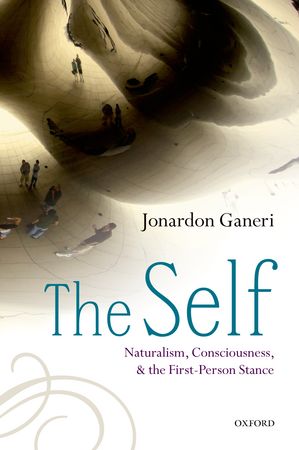 Reading Group 讀書會 2013/7/17(三)2:00 PM 2013/6/14(五)4:00 PM 政治大學百年樓哲學系330227室 研讀文獻: Ganeri, Jonardon. 2012. The self: naturalism, consciousness, and the first-person stance. Oxford: Oxford University Press. Chapter 7 & 8. About the book: What is it to occupy a first-person stance? Is the first-personal idea one has of oneself in conflict with the idea of oneself as a physical being? How, if there is a conflict, is it to be resolved? The Self recommends a new way to approach those questions, finding inspiration in theories about consciousness and mind in first millennial India. These philosophers do not regard the first-person stance as in conflict with the natural — their idea of nature is not that of scientific naturalism, but rather a liberal naturalism non-exclusive of the normative. Lecture
 中國學術性佛學研究的現況觀察與反思:兼再論幽靈問題 中國學術性佛學研究的現況觀察與反思:兼再論幽靈問題劉宇光教授 復旦大學哲學學院 時間:2013年 4月 11日(週四)下午3-5時 地點:政治大學山上校區百年樓哲學系圖書室 About the Lecturer: 劉宇光,復旦大學哲學學院副教授,復旦佛教研究團隊(FDTBS)負責人。現階段主要研究東亞有相唯識哲學,另兼治現代佛教政治-宗教關係相關問題,及佛教研究方法論。2013冬將出版《東亞有相唯識學所知障概念的哲學研究》及《西方學界佛教因明-量論研究手册》(兩書皆由上海復旦大學出版社刋行)。同時譯有西方學者的藏傳佛教哲學研究專著兩種,Anne Klein, Knowledge and Liberation (2012) 及Elizabeth Napper, Dependent Arising and Emptiness (2006)。 Lecture
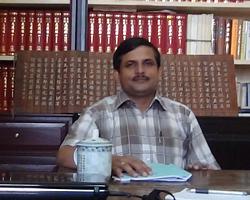 梵文經典讀誦教學 梵文經典讀誦教學Prof. Kashinath Nyaupane 尼泊爾梵文大學(Nepal Sanskrit University, Kathmandu) 時間:2013年 4月 2日(週二)中午12-2點 地點:政治大學山上校區百年樓哲學系圖書室 About the Lecturer: Kashinath Nyaupane,尼泊爾梵文大學(Nepal Sanskrit University, Kathmandu)佛學研究部(Bauddha darshana)教授兼主任。博士論文為關於彌曼沙學派對於佛教的批判。教授著作等身,包括Bauddhadarsanabhumih, A Sanskrit text, Nepal skt. Academy, 2010; Sautrāntikadarshanasangraha, A Sanskrit text, Nepal Skt. Academy, 2011; Lankāvatārasutram, Nepali translation, Jayatu sanskritam, Nepal, 2012; Guhyasamājatantra, translation in Hindi, Indica Books Benares, 2012; Manjushrināmasangiti, translation in Nepali, Nepal Skt. Academy, 2012等等。Nyaupane教授並曾經在2011年於中國江西寶峰寺,與德國漢堡大學印度與藏學系Harunaga Isaacson教授一同主持2011年國際梵文經典讀誦與研習結夏安居營。 Lecture Series
講座系列:佛教哲學的意識與意向性 Speakers: Dan Arnold (University of Chicago) Christian Coseru (College of Charleston) Venue : Library Room, Department of Philosophy, Chengchi University 政治大學百年樓哲學系圖書室 2013/ 3/ 8 (Fri) 14: 00-16: 00 Christian Coseru, "Consciousness and Intentionality: Terminological Preliminaries" 意識與意向性:問題初論 2013/ 3/ 9 (Sat) 9: 20-9: 30 Introduction 9: 30-12: 00 Dan Arnold, "On the Temporality of Self-Consciousness (svasaṃvitti)" 論自證的時間性 14: 00-17: 00 Christian Coseru, "Self-Awareness and the First-Person Stance: Charting the Phenomenology of Svasaṃvedana" 自證與第一人稱觀點:論自證現象學 2013/ 3/ 10 (Sun) 9: 30-12: 00 Christian Coseru, "Who's Afraid of Naturalism?" Non-eliminative Reductionism and the Enlightened Mind" 「誰怕自然主義?」非消除性化約主義與開悟的心靈 14: 00-17: 00 Dan Arnold, "Intentionality and the 'Conventional Truth' of Madhyamaka" 意向性與中觀的世俗諦 2013/ 3/ 11 (Mon) 9: 30-12: 00 Dan Arnold, Reading the Viṃśatikā 解讀《唯識二十論》 About the Lecturers:  Daniel A. Arnold Daniel A. ArnoldAssociate Professor of the Philosophy of Religions, University of Chicago Dan Arnold is a scholar of Indian Buddhist philosophy, which he engages in a constructive and comparative way. His first book – Buddhists, Brahmins, and Belief: Epistemology in South Asian Philosophy of Religion (Columbia University Press, 2005) – won an American Academy of Religion Award for Excellence in the Study of Religion. His second book – Brains, Buddhas, and Believing: The Problem of Intentionality in Classical Buddhist and Cognitive-Scientific Philosophy of Mind (Columbia University Press, 2012) – centers on the contemporary philosophical category of intentionality, taken as useful in thinking through central issues in classical Buddhist epistemology and philosophy of mind. Prof. Arnold's webpage  Christian Coseru Christian CoseruAssociate Professor of Philosophy, College of Charleston Christian Coseru is the author of Perceiving Reality: Consciousness, Intentionality and Cognition in Buddhist Philosophy (New York: Oxford University Press, 2012), which offers a defense of phenomenological naturalism in comparative philosophy of mind; he is currently completing another book manuscript on phenomenological and analytic philosophical perspectives on consciousness. He teaches courses in Metaphysics, Indian and Buddhist philosophy, and Philosophy of Mind. Prof. Coseru's webpage Prepanels
Prepanels to Lecture Series: Consciousness and Intentionality in Buddhist Philosophy 「佛教哲學的意識與意向性」講座系列導讀 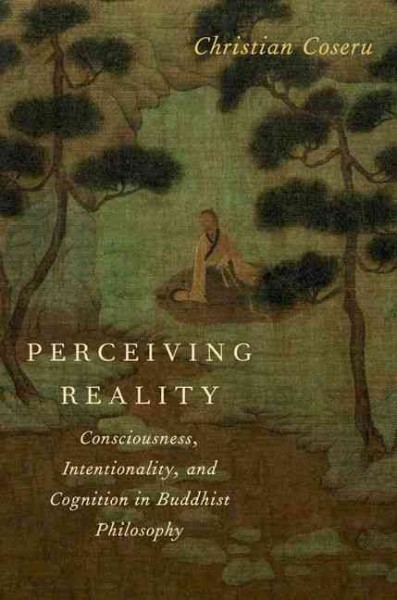 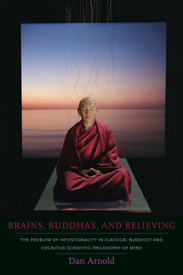 Date: 2013/ 03/ 02 (Sat) 9:30-16:00 Venue: Library Room, Department of Philosophy, Chengchi University 政治大學百年樓哲學系圖書室 主持人:林鎮國教授 導讀人:耿晴教授、汪純瑩、林恕安、胡志強 研讀文獻: 1.
Arnold, Dan. 2012. Brains, Buddhas, and Believing: The Problem of Intentionality in Classical Buddhist and Cognitive-Scientific Philosophy of Mind. New York: Columbia University Press, chapter 5. 2.
Arnold, Dan. 2010. "Nāgārjuna's 'Middle Way' : A non-eliminative understanding of selflessness," Revue Internationale de Philosophie 3/253: 367–395. 3.
Coseru, Christian. 2012. Perceiving Reality : Consciousness, Intentionality, and Cognition in Buddhist Philosophy. New York: Oxford University Press, chapter 2. 4.
Coseru, Christian. forthcoming. "Taking the Intentionality of Perception Seriously: Why Phenomenology is Inescapable," Philosophy East and West 65 (3). Lecture and Roundtable
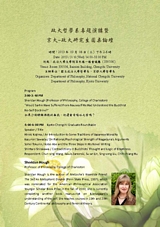 Lecture by Prof. Sheridan Hough and Kyoto-Chengchi Graduate Roundtable Lecture by Prof. Sheridan Hough and Kyoto-Chengchi Graduate Roundtable政大哲學系專題演講暨京大-政大研究生圓桌論壇 Date: 2013/ 03/ 06 (Wed) 14:00-18:00 Venue: Room 330106, Bainien Building, Chengchi University 政治大學文學院百年樓一樓會議廳(330106) Program 2:00-3: 40 PM Sheridan Hough (Professor of Philosophy, College of Charleston) "Would Sartre Have Suffered From Nausea If He Had Understood the Buddhist No-Self Doctrine?" 如果沙特瞭解佛教的無我,他還會有嘔吐之苦嗎? 4: 00-6: 00 PM Kyoto-Chengchi Graduate Roundtable Speaker / title Hiroki Kojima / An Introduction to Some Traditions of Japanese Morality Kazunori Sawada / On Rational/Psychological Strength of Nagarjuna's Arguments Sohei Tokuno / Kobo Abe and the Three Steps in His Novel Writing Shintaro Shirakawa / Contradictions in Buddhists' Thought and Logic of Emptiness Respondent : Chun ying Wang, Jakub Zamorski, Su an Lin, Sing song Liu, Chih chiang Hu  About the Lecturer: About the Lecturer:Sheridan Hough Professor of Philosophy, College of Charleston Sheridan Hough is the author of Nietzsche's Noontide Friend: The Self As Metaphoric Double (Penn State Press, 1997), which was nominated for the American Philosophical Association Younger Scholar Book Prize in the fall of 2000; she is currently completing another book manuscript on Kierkegaard's understanding of the self. She teaches courses in 19th and 20th Century Continental philosophy and feminist theory. Prof. Hough's webpage Chengchi-Kyoto Joint Workshop on Buddhist Analytic Philosophy
Venue: 政治大學文學院百年樓一樓會議廳(330106) 9: 30-9: 40 Introduction 9: 40-10: 40 Yasuo Deguchi: Constructing a Philosophical Logic of Emptiness: Nishitani, Zisang, and Paraconsistency 10: 40-11: 20 Su-an Lin: Dignāga and Bhāviveka on Universal (samanya-lakṣaṇa) 11: 20-12: 00 Chun-ying Wang: The Missing/Mysterious Dimension: the Methodological Significance of the Ultimate in Buddhist Epistemology and the Transcendental in Kant 12: 00-2: 00 Lunch Break 2: 00-2: 40 Chih-chiang Hu: Some Remarks on the Notion of Backwards Causality: Dummett and Prajñākaragupta 2: 40-4:40 Ching Keng, Hans-Rudolf Kantor, Chien-hsing Ho Reading the Wubuqien lun(物不遷論) 4: 40-5: 00 Concluding Discussion New Book
空性與方法:跨文化佛教哲學十四論 作者:林鎮國 2012.12 政大出版社 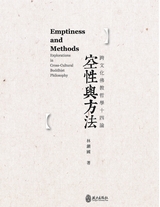 本書以空性與方法為題,是受到嘉達美《真理與方法》的啟發。如何從方法/非方法中開顯存有/真理,原是各家哲學所共許的目標,佛教哲學也不例外。凡能落實在邏輯、知識、倫理、歷史、宗教的層次,應機設教,有效達成解脫論目標,方法的多元主義本來就符合佛教的立場。副標題所強調的「跨文化佛教哲學」進路,說明本書聚焦於跨文化情境中佛教意義世界的孳乳、繁衍與豐富:初期大乘瑜伽行派如何看待「證成道理」,陳那如何在邏輯、知識論與語言哲學議題上全面和各印度哲學派交鋒,促成印度哲學的知識論轉向,龍樹如何在《迴諍論》中質疑量論的合法性,中世紀漢語佛教徒如何學習來自印度的邏輯和知識論,後來的發展又如何影響近代東亞二種哲學型態的形成,這些都是本書關切的議題。其他如從「智的現象學」抉發天台智顗的一心三觀,從敘事與行事性言說重新解讀神會禪學的類形上學命題,從德里達的〈暴力與形上學〉接引列維納斯和龍樹的哲學對話,從布特曼解神話詮釋學審視印順的人間淨土思想,甚至於從西谷啟治論空的歷史性比較京都學派和新儒家的歷史意識,都是跨文化與跨方法論下具體的詮釋實踐。 本書以空性與方法為題,是受到嘉達美《真理與方法》的啟發。如何從方法/非方法中開顯存有/真理,原是各家哲學所共許的目標,佛教哲學也不例外。凡能落實在邏輯、知識、倫理、歷史、宗教的層次,應機設教,有效達成解脫論目標,方法的多元主義本來就符合佛教的立場。副標題所強調的「跨文化佛教哲學」進路,說明本書聚焦於跨文化情境中佛教意義世界的孳乳、繁衍與豐富:初期大乘瑜伽行派如何看待「證成道理」,陳那如何在邏輯、知識論與語言哲學議題上全面和各印度哲學派交鋒,促成印度哲學的知識論轉向,龍樹如何在《迴諍論》中質疑量論的合法性,中世紀漢語佛教徒如何學習來自印度的邏輯和知識論,後來的發展又如何影響近代東亞二種哲學型態的形成,這些都是本書關切的議題。其他如從「智的現象學」抉發天台智顗的一心三觀,從敘事與行事性言說重新解讀神會禪學的類形上學命題,從德里達的〈暴力與形上學〉接引列維納斯和龍樹的哲學對話,從布特曼解神話詮釋學審視印順的人間淨土思想,甚至於從西谷啟治論空的歷史性比較京都學派和新儒家的歷史意識,都是跨文化與跨方法論下具體的詮釋實踐。More info: click here Lectures
講座系列:敦煌文獻和佛教研究 Stephen F. Teiser 太史文 D.T. Suzuki Professor in Buddhist Studies and Professor of Religion Director, Program in East Asian Studies, Princeton University 地點:政治大學山上校區百年樓一樓會議廳(330106) 講座一 2012/12/20(四)2:00-4:00 PM 研究中國佛教的各種方法 Approaches to the Study of Chinese Buddhism 講座二 2012/12/21(五)10:00-12:00 AM 治療疾病的原理 The Philosophy of Healing 講座三 2012/12/22(六)10:00-12:00 AM 語言、書寫和表演 Language, Writing, Performance Readings: 1.
Rong Xinjiang, chapter 12, Dunhuangxue shibajiang 敦煌學十八講, background to current research, on the significance of Dunhuang manuscripts for the study of Chinese Buddhism. ( pdf ) 2.
Primary text from Huang Zheng and Wu Wei, Dunhuang yuanwen ji 敦煌願文集, subject of lectures 2 and 3. ( pdf ) 3.
Taishi Wen (Stephen F. Teiser), “Shilun zhaiwen de biaoyanxing 試論齋文的表演性,” example of one approach used in current research on Buddhist liturgical manuscripts from Dunhuang. ( pdf ) 4.
Hou Xudong, preface to Chinese translation of The Ghost Festival in Medieval China 幽靈的節日 (1999), assessment of the state of the field of the social history of Chinese religion. ( pdf ) 5.
Winston Kyan, review of Reinventing the Wheel, College Art Association Reviews, critical review of 2006 book. ( pdf ) About the Lecturer: Stephen F. Teiser(太史文),普林斯頓大學鈴木大拙佛學講座教授、宗教系教授、東亞研究學程主任,為國際知名的佛學與中國宗教研究學者,其著作Reinventing the Wheel: Paintings of Rebirth in Medieval Buddhist Temples (2006) 於2007年獲頒被譽為漢學界諾貝爾獎的「儒蓮獎」(Prix Stanislas Julien)。其他重要著作如The Ghost Festival in Medieval China (1988)、“The Scripture on the Ten Kings” and the Making of Purgatory in Medieval Chinese Buddhism (1994)。本次講座除發表關於敦煌齋文、表演、療癒等近期研究成果,也將討論中國佛教研究方法的議題。 Prepanels
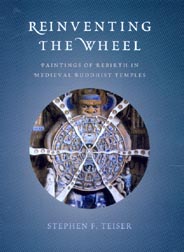 Prof. Stephen F. Teiser(太史文)講座系列導讀 Prof. Stephen F. Teiser(太史文)講座系列導讀2012/12/08(六)9:00-16:00 政治大學山下校區 研究大樓一樓250102室 哲學基礎研究室 (校門左側) 研讀文獻: Stephen F. Teiser, 2006, Reinventing the Wheel: Paintings of Rebirth in Medieval Buddhist Temples, University of Washington Press. 該書於2007年獲頒被譽為漢學界諾貝爾獎的「儒蓮獎」(Prix Stanislas Julien)。 主持人:李玉珍教授(政治大學宗教研究所) 導讀人:Jens Reinke(政治大學宗教研究所碩士班)、黃美英(政治大學宗教研究所博士班)、邱郁霖(政治大學宗教研究所博士班)、Tyler Feezell(政治大學宗教研究所碩士班) 1.
Picturing Life and Death as a Wheel (Jens Reinke 導讀) 2.
The Canonical Version of the Wheel of Rebirth (黃美英 導讀) 3.
Temples and Legends: Western India, 350-550 C.E. (邱郁霖 導讀) 4.
King Rudrayana's Painting of the Twelve Conditions (Jens Reinke 導讀) 5.
La roue imaginaire en Chine (邱郁霖 導讀) 6.
Wheels for Meditation: Kumtura, Central Asia, Ninth Century (黃美英 導讀) 7.
Wheels in Cave Temples: Yulin, Gansu, Tenth Century (邱郁霖 導讀) 8.
Wheels in Esoteric Temples: Tabo, Western Tibet, Eleventh Century (Tyler Feezell 導讀) 9.
Wheels for Pilgrims: Baodingshan, Sichuan, Thirteenth Century (Tyler Feezell 導讀) 10.
Conclusions Lecture
 專題演講:曇鸞「十念相續」的空觀內涵與善導的「十聲」教法 專題演講:曇鸞「十念相續」的空觀內涵與善導的「十聲」教法講者:陳劍鍠 教授(國立屏東教育大學中國語文學系) 時間:2012年 12月 06日(四)09:10-12:00 AM 地點:政治大學山上校區百年樓 哲學系330227室 Related material: 陳劍鍠,2009,《行腳走過淨土法門:曇鸞、道綽與善導開展彌陀淨土教門之軌轍》,臺北:商周,第二章、第五章。 聯絡人:胡志強 buddhismstudy@yahoo.com.tw Lecture
 Development of Rhetorical Devices in the Sarvāstivāda Ṣaṭpādābhidharma Texts Development of Rhetorical Devices in the Sarvāstivāda Ṣaṭpādābhidharma TextsProf. Bart Dessein Department of Languages and Cultures of South and East Asia, Ghent University 時間:2012年 10月 25日(四)上午10 - 12 時 地點:政治大學山上校區百年樓 哲學系330227室 Related material: B. Dessein (2012). "'Thus Have I Heard' and other claims to authenticity: Development of Rhetorical Devices in the Sarvāstivāda Ṣaṭpādābhidharma Texts", in Ch. Anderl (ed.), Zen Buddhist Rhetoric in China, Korea, and Japan. Leiden: E.J. Brill, pp. 121-162. Lecture
專題演講:宋明楞嚴學與中國佛教的正統性——以華嚴、天臺《楞嚴經》疏為中心 講者:龔雋 教授(廣州中山大學哲學系) 時間:2012年 11月 01日(四)10:30-12:00 AM 地點:政治大學山上校區百年樓 哲學系330227室 Related material: 龔雋,〈宋明楞嚴學與中國佛教的正統性:以華嚴、天臺《楞嚴經》疏為中心〉,《中國哲學史》2008年第3期,頁33-47。 聯絡人:胡志強 buddhismstudy@yahoo.com.tw Workshop on “Buddhist Logic and Epistemology in Chinese Sources”
Date: 2012/10/12-13 Venue: National Chengchi University, Taipei Chen-kuo Lin 林鎮國 (National Chengchi University, Taiwan) Comparing the attention to the Sanskrit and the Tibetan sources, the Chinese texts and commentaries in the studies of Buddhist logic and epistemology have been largely neglected. Such negligence prevents us having a fair picture of the development of Buddhist logic and epistemology as a whole. In order to fill the gap of our knowledge in this regard, it is the aim of this workshop to lay down a preliminary ground for the study of Buddhist logic and epistemology in the Chinese sources. In this workshop, we will focus on some of the texts which are most essential in this field, while the main philosophical issues are also on the agenda of exploration. This workshop is publication-oriented. Program 2012/10/12 9: 30-11: 30 Shoryu Katsura: Upāyahṛdaya(/Prayogasāra) Seen from the Eyes of Carakasaṃhitā and Nyāyasūtra Zhihua Yao: Non-activity (nirvyāpāra) in Pre-Dignāga Sources 13: 30-17: 00 Toru Funayama: Yijing's translation of Dignāga's Sāmānyaparīkṣā (Examination of the Universal), with special reference to stylistic problems Shinya Moriyama: A comparison between the Indian and Chinese interpretations of the antinomic reason (viruddhāvyabhicārin) Ching Keng: The Theory of Atom (Paramāṇu) in Dharmapāla’s Guang bai lun shi lun (A Commentary on the Catuḥśataka) 2012/10/13 9: 30-11: 30 Jeson Woo: How to Attain Enlightenment: Dharmakīrti and Hui-neng on the Practice of Meditation Chen-kuo Lin: How to meditate with the knowledge of particulars and universals for attaining the enlightenment? -- Huizhao on svalakṣaṇa and sāmānyalakṣaṇa 13: 30-17: 00 Chien-hsing Ho: The Notion of Apoha in Chinese Buddhism Jakub Zamorski: On the understanding of negation in Chinese Buddhist logic Ernest Brewster: The Zen of Logic – the Argument for “Mind-Only” in Yongming Yanshou’s Cittamātra System Lecture
「漢傳佛教視野中的時間問題」專題演講 Perspectives on the Issue of Time in Chinese Buddhism Prof. Hans-Rudolf Kantor 康特教授 華梵大學東方人文思想研究所 時間:2012年 10月 18日(四)上午10 - 12 時 地點:政治大學山上校區百年樓 哲學系330227室 Related materials: 2008 〈虛假當念之時間構造-以天臺宗及華嚴宗為主〉,《台大佛學研究學報》, 16: 171-228. 2008 〈中觀學的時間觀〉,《正觀》, 46: 39-79. 2011 "The Ambivalence of Illusion – A Chinese Buddhist Perspective", Journal of Chinese Philosophy, 38,2: 274-293. 聯絡人:胡志強 buddhismstudy@yahoo.com.tw Lectures
 Prof. Dan Arnold's Lecture Series 2013 Prof. Dan Arnold's Lecture Series 2013講座系列 2013 Reading Group 讀書會 2012/9/13起 每週四 14:00 PM 政治大學山上校區百年樓 哲學系東方哲學研究室(330228) 研讀文獻:Brains, Buddhas, and Believing: The Problem of Intentionality in Classical Buddhist and Cognitive-Scientific Philosophy of Mind Dan Arnold is associate professor of philosophy of religions at the University of Chicago Divinity School, where he also received his Ph.D. His first book, Buddhists, Brahmins, and Belief: Epistemology in South Asian Philosophy of Religion, won an American Academy of Religion Award for Excellence in the Study of Religion. Colloquium
Colloquium of Buddhist Studies 時間:週四 9:00 AM 地點:政治大學山上校區百年樓 哲學系330227室 日期 報告人 主題 9/20 莊朋:空與解脫 - 印順中觀思想研究 9/27 釋法弘:天台化法四教論佛教諸宗之時間觀 10/4 汪純瑩:先驗邏輯與精神發展 -- 從陳那與康德的批判知識論談起 10/12-13 Workshop on Chinese Buddhist Logic and Epistemology 10/18 康特教授:漢傳佛教視野中的時間問題 10/25 Bart Dessein教授:Development of Rhetorical Devices in the Sarvāstivāda Ṣaṭpādābhidharma Texts 11/1 9:00-10:20孫亞柏:Pure Land practice and Consciousness-Only doctrines in Republican China - the case of Tang Dayuan 唐大圓 (1890(?)-1914); 10:30-12:00龔雋教授:宋明楞嚴學與中國佛教的正統性——以華嚴、天臺《楞嚴經》疏為中心 11/8 下午 第二屆梵學佛學會議 劉宇光、何歡歡報告 11/15 劉興松:晚明的佛教與佛事—三教中的《楞嚴經》與「水陸法會」 11/22 期中考週 停課 11/29 林恕安:清辨對於溝通二諦的看法 12/6 陳劍鍠教授:曇鸞「十念相續」的空觀內涵與善導的「十聲」教法 12/13 胡志強:先果後因?關於逆時因果理論的幾點反思 12/20 Stephen Teiser教授「敦煌文獻和佛教研究」講座系列 12/27 釋行願:中越禪學思想研究-六祖惠能與竹林禪派初祖陳仁宗之比較;簡凱廷:漢傳中觀學的「四句」論式(tetralemma)研究——以《大智度論》、《中觀論疏》為主 1/3 老師出國開會 1/10 謝宛汝:西谷啟治論「時間」與「歷史」;黃啟文 Lecture
「通往涅槃的階梯:二十僧的結構分析」專題演講 Prof. James B. Apple Department of Religious Studies, University of Calgary 時間:2012年 5月 28日(一)下午3 - 5 時 地點:政治大學山上校區 百年樓二樓 宗教所會議室(330211) Abstract 演講摘要: 「二十僧」在傳統西藏佛教研究中是一個最有發展性的主題之一。「僧伽」(Saṃgha)是普遍為佛教徒所尊崇的三寶之一,構成體現佛陀聖教之聖者的理想團體。二十僧列舉了修行者必須歷經之所有可能的階位,這些階位由於修行者在宇宙中所處的位置、其根器、其禪定修習與智慧之程度之不同而有差異。本演講主要根據14世紀西藏學者宗喀巴對於「僧」提出的詮釋,嘗試概述「二十僧」這個論題在西藏佛教文化中之重要性,並且分析「二十僧」的結構。 The Twenty Varieties of the Saṃgha (Tib. dge ’dun nyi shu) is one of the most formative subjects in traditional Tibetan Buddhist studies. The Saṃgha is one of the Three Jewels (‘Buddha, Dharma, Saṃgha’) universally revered by all Buddhists and is comprised of the ideal community of Noble Persons who embody the Buddha’s teachings. The Twenty Saṃghas enumerates all the possible stages through which any given individual might pass, depending upon factors such as that individual’s cosmological circumstances, the acuity of his or her faculties, and the individual’s degree of meditative cultivation and cognitive insight. This presentation centers on the interpretation of the Saṃgha given by the 14th century Tibetan scholar Tsong-kha-pa blo-bzang grags-pa. The presentation provides an overview of the importance of the Twenty Saṃghas in Tibetan Buddhist culture and a structural analysis of the topic’s overall content. Related materials: Apple, James. Stairway to Nirvāṇa: A Study of the Twenty Saṃghas based on the works of Tsong-kha-pa, New York: State University of New York Press (2008). Apple, James. "An Assembly of Irreversible Bodhisattvas. Twenty Varieties of the Saṃgha: A Typology of Noble Beings (Ārya) in Indo-Tibetan Scholasticism (Part 2)", Journal of Indian Philosophy (2004) 32: 211-279. Apple, James. "The Mahāyāna Path of the Bodhisattva in the Ornament of Clear Realization", Religion Compass (2011) 5/5: 166-179. Lecture
講者:程恭讓(華梵東方人文思想研究所教授) 時間:2011年12月23日(五)下午2-4時 地點:政治大學宗教所會議室(文學院百年樓二樓330211室) 主持人: 林鎮國(政治大學哲學系教授) 李豐楙(政治大學華人宗教研究中心主任) 主辦單位: 政治大學華人宗教研究中心 政治大學宗教研究所 六-七世紀漢語文化圈的印度佛教思潮研究計畫 Contact: 02-29393091#62216 蔡助理 crs@nccu.edu.tw Lectures
講座系列:佛教哲學中的自證與主體性問題 Birgit Kellner Professor of Buddhist Studies, University of Heidelberg 講座一 2011/12/9(五)10:00-12:00 AM 佛光大學雲水軒佛教學系 Epistemology and logic in Buddhism - reflections on rationality in religious discourse 佛教知識論與邏輯:宗教論述中的合理性 講座二 2011/12/10(六)10:00-12:00 AM 政治大學山下校區研究大樓哲學基礎研究室 Self-awareness (svasaṃvedana), mental forms (ākāra) and subjectivity: critical issues in the Buddhist philosophy of mind 自證、行相與主體性:佛教心靈哲學的關鍵性議題 講座三 2011/12/12(一)10:00-12:00 AM 政治大學山下校區研究大樓哲學基礎研究室 Dignāga and Dharmakīrti on the subjectivity of experience: reading and discussion of selected passages 陳那與法稱論經驗的主體性:法稱《釋量論》(Pramāṇavārttika 3.340-350)選讀 PrePanels 導讀座談 2011/11/5(六)14:00-18:00 PM 政治大學山下校區 研究大樓哲學基礎研究室 研讀文獻: Dharmakīrti, Pramāṇavārttika 3.340-350 with Manorathanandin’s commentary Dharmakīrti, Pramāṇaviniścaya (Steinkellner’s edition pp. 36-38) ( pdf ) 戶崎宏正,《佛教知識論の研究》,下卷,頁25-36 ( pdf ) (何建興教授 pdf 、陳一標教授導讀) 2011/11/12日(六)14:00-18:00 PM 政治大學山下校區 研究大樓哲學基礎研究室 研讀文獻: 1.
Dan Arnold, “Self-Awareness (svasaṃvitti) and Related Doctrines of Buddhists Following Dignāga: Philosophical Characterizations of Some of the Main Issues,” Journal of Indian Philosophy (2010) 38: 323-378, especially 347-357. (胡志強、汪純瑩 link 導讀) 2.
Birgit Kellner, “Self-Awareness (svasaṃvedana) in Dignāga’s Pramāṇasamuccaya and -vṛtti: A Close Reading,” Journal of Indian Philosophy (2010) 38: 203-231, especially pp. 220ff. (林恕安導讀) (閱讀材料請來信索取: buddhismstudy@yahoo.com.tw ) Indian Buddhist Thought in 6th-7th Century China. 2011 Concluding Workshop
Date: 2011/12/02-03 Venue: National Chengchi University, Taipei Project Leader: Chen-kuo Lin 林鎮國 (National Chengchi University, Taiwan) Participants: Yoke Meei Choong 宗玉媺 (Fo Guang University, Taiwan) Chien-hsing Ho 何建興 (Nanhua University, Taiwan) Hans-Rudolf Kantor 康特 (Huafan University, Taiwan) Shoryu Katsura 桂紹隆 (Ryukoku University, Japan) Ching Keng 耿晴 (National Chengchi University, Taiwan) Dan Lusthaus (Harvard University, USA) Michael Radich (Victoria University of Wellington, New Zealand) Weijen Teng 鄧偉仁 (Dharma Drum Buddhist College, Taiwan) Zhihua Yao 姚治華 (Chinese University of Hong Kong) Jakub Zamorski 孫亞柏 (National Chengchi University, Taiwan) Michael Zimmermann (Hamburg University, German) Session I. Individual Papers Dan Lusthaus: Some Observations on the Introduction and Impact of Indian Debate and Logic on China in the Sixth and Seventh Century: From Gautama Prajñāruci to Wŏnhyo Teng Weijen: On the Significance and Application of the Concept "jianbie 簡別" in Chinese Buddhist Logic Ching Keng: On the Notion of "the Transformation of the Basis" in the Yogācāra Tradition—A Re-consideration of Schmithausen's Critique of Takasaki Session II. Pre-publication Review I: Pramāṇavāda in China 1) Lusthaus: Some Observations on the Introduction and Impact of Indian Debate and Logic on China in the Sixth and Seventh Century: From Gautama Prajñāruci to Wŏnhyo 2) Funayama: “Chinese Translations of Pratyakṣa” 3) Lin: “Epistemology and Meditation in Jingying Huiyuan (523-592)'s Essay on Three Measures of Valid Cognition” 4) Katsura: “Theory of Apoha in Kuiji’s Cheng weishi lun shuji” 5) Zamorski: “Against one’s own words.” On the problem of self-refuting statements in Chinese Buddhist logic 6) Teng Weijen: On the Significance and Application of the Concept "jianbie 簡別" in Chinese Buddhist Logic 7) Zimmermann: The Process of Awakening in Early Texts on Buddha-nature in India 8) Keng: A Preliminary Re-examination of the Relation between the Awakening of Faith and the Dilun Thought: Focusing on the Works of Huiyuan (523-592 CE) Session III. Concluding Discussion I Topics: the issues of Sinification as seen in the edited volume Session IV. Individual Papers Lin Chen-kuo: Epistemology and Meditation in Jingying Huiyuan's Essay on Three Measures of Valid Cognition, revised edition Michael Radich: Consciousness as it features in Chinese debates on “immortality of the soul” Hans-Rudolf Kantor: Zhiyi's critique of the Dilun's Concept of Mind Zhihua Yao: The Yogācāra Critiques of the Two Truths Session V. Pre-publication Review II: Yogacācāra, Tathāgatagarbha and Mādhyamika in China 9) Radich: Consciousness as it features in Chinese debates on “immortality of the soul” 10) Kantor: Philosophical Aspects in 6th Century Chinese Buddhist Debates on “Mind and Consciousness” 11) Muller: Demarcating the Afflictive and Cognitive: Origins of Two Hindrances Systems in Yogâcāra and Tathāgatagarbha 12) Chu: On the Notion of Kaidaoyi (*Avakāśadānāśraya) Discussed in Xuanzang's Cheng weishi lun 13) Yao: The Yogācāra Critiques of the Two Truths 14) Ho: The Way of Nonacquisition: Jizang’s Philosophy of Ontological Indeterminacy 15) Choong: The Fission of Indian Interpretations in China—Commentaries on the Parable of the Raft in the Vajracchedikā 16) McRae: Indo-immunity: The Resistance of Chinese Chan to recent/contemporaneous innovations based on Indian Buddhism Session VI. Concluding Discussion II Topics: the edited volume’s contribution to the field of research 漢傳佛教因明專題講座
講者:鄭偉宏 教授(復旦大學哲學學院) ◆ 線上報名 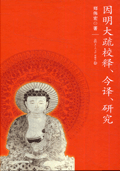 講題一:因明巨擘 唐疏大成——窺基《因明大疏》研究 講題一:因明巨擘 唐疏大成——窺基《因明大疏》研究時間:2011年11月8日(二)2:10-4:00 PM 地點:政治大學百年樓一樓演講廳(330111) 講題二:論陳大齊對漢傳因明的卓越貢獻 時間:2011年11月12日(六)10:00-12:00 AM 地點:政治大學山下校區研究大樓哲學基礎研究室 講者簡介: 鄭偉宏,復旦大學哲學學院教授,著有《佛家邏輯通論》、《因明正理門論直解》、《漢傳佛教因明研究》、《因明大疏校釋、今譯、研究》等,為知名的因明(佛教邏輯)專家。 Indian Buddhist Thought in 6th-7th Century China International Workshop 2011
 Date: 2011/06/19~20 Venue: The Conference Room of the College of Liberal Arts ( Room 330106, Below the Graduate Institute of Religious Studies ), Bainian Building, Upper Campus, National Chengchi University Theme: Indian Philosophy in Chinese Sources Katsura, Shōryū Kui-ji's Records of the Vaiśeṣika Doctrines Dan Lusthaus Fallacies, Refutations, and Evaluations: The Chinese Reception of Hetuvidyā Lin, Chen-kuo A Study and Annotated Translation of Huizao (648-714)’s Treatise on Two Measures of Cognition Theme: Yogâcāra & Tathāgatagarbha (I) Michael Zimmermann The Process of Awakening in Early Texts on Buddha-nature in India Michael Radich Pure Mind in China: Chinese Background to Paramārtha's *Amalavijñāna Theme: Yogâcāra & Tathāgatagarbha (II) Yao, Zhihua The Yogācāra Critiques of the Two Truths Keng, Ching In Search of the Doctrinal Differences between the Shorter and the Longer Versions of the Ratnagotravibhāga Theme: Issues in Buddhist Epistemology Chu, Junjie Dignāga on Mental Perception and Self-Awareness Choong, Yoke Meei The Indian and Chinese Interpretations of dharma and adharma of the parable of the raft Jakub Zamorski “Against one’s own words.” Problem of self-refuting statements in Chinese Buddhist logic Theme: Issues in Chinese Buddhist Philosophy Ho, Chien-hsing The Way of Nonacquisition: Jizang’s Philosophy of Ontological Indeterminacy Hans-Rudolf Kantor The Linguistic Pragmatics and Sign-System according to the Chinese Huayan-School Lecture
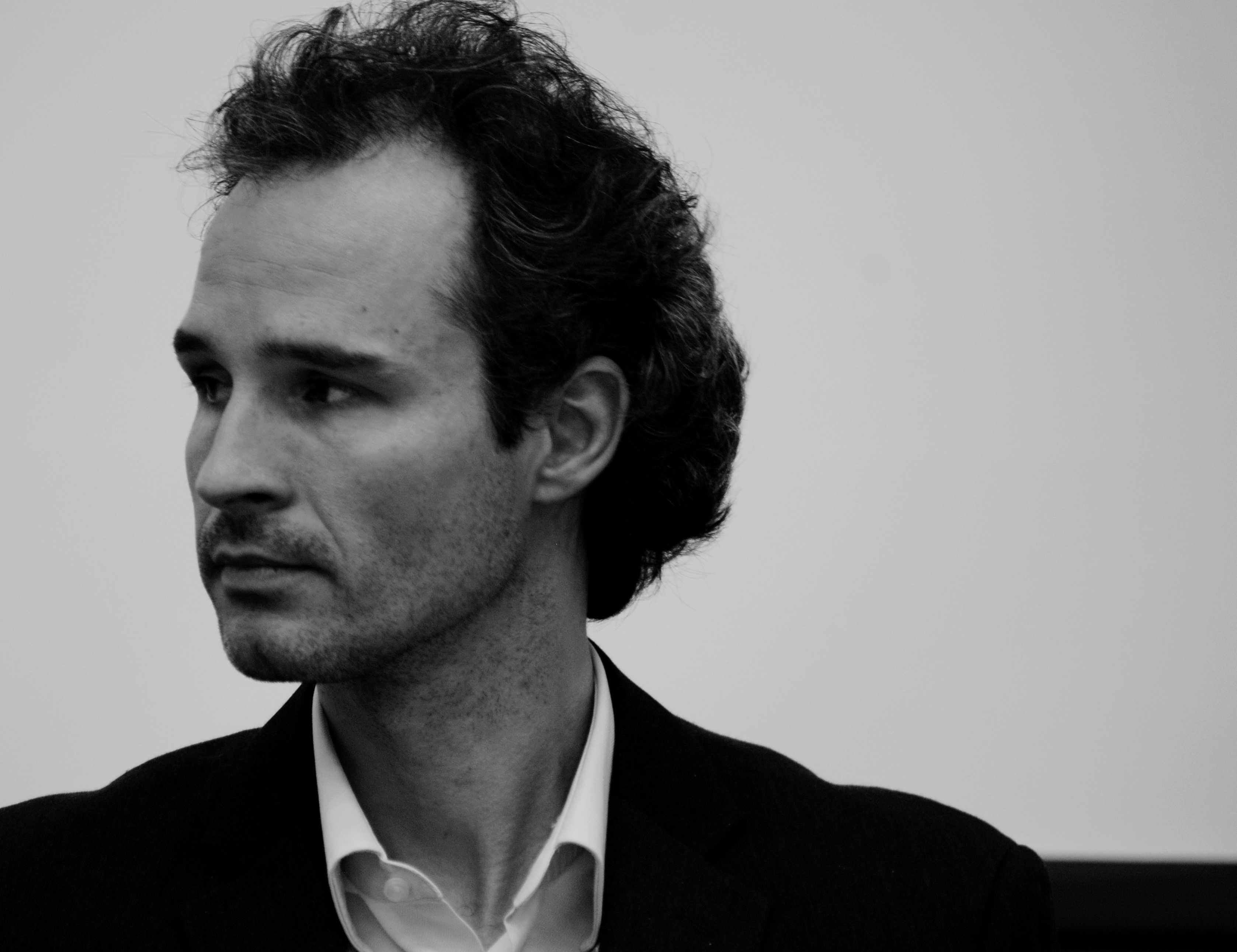 Title: "Confucian Tourists and Closet Buddhists - Traveling to Mount Putuo in the 16th and 17th centuries" Speaker: Marcus Bingenheimer 馬德偉 (Dharma Drum Buddhist College) Date: 2011/5/28 13:00-14:30 Venue: 政治大學研究大樓哲學基礎研究室 Buddhist Epistemology and Soteriology
 第一場 日期:2011/05/07(六)14:00~16:30 地點:政治大學研究大樓哲學基礎研究室 ◆ 線上報名 發表人與講題: 汪純瑩 Chun-Ying WANG(政大哲研所博士生) 白立冰 Ernest Billings BREWSTER(政大宗教所博士生) 劉興松 Sing Song LIU (政大宗教所博士生) 第二場 日期:2011/05/28(六)14:30~16:50 地點:政治大學研究大樓哲學基礎研究室 ◆ 線上報名 發表人與講題: 林恕安 Su-an LIN(政大宗教所博士生) 嚴瑋泓 Wei-Hung YEN(東海大學哲學系助理教授) 孫亞柏 Jakub ZAMORSKI (政大哲研所博士生) ◆議程下載:Agenda.pdf |◆ 線上報名|◆連絡信箱:buddhismstudy@yahoo.com.tw 禪宗學史專題演講
從胡適到現代漢語世界的禪宗學史書寫 ── 一種學術史的評論  ◆講者: 龔雋 教授(廣州中山大學) ◆時間:2011年2月25日(星期五)下午2-4點 ◆地點:國立政治大學山上校區-「百年樓1樓文學院會議廳」(330106室,位於宗教所正樓下開放的研討室。) ◆閱讀材料:〈中國近現代禪學史研究評述-從胡適到現代漢語世界禪學史的書寫〉( pdf ) Lecture Series
Lecture Series: Buddhist Philosophers and Their Indian Interlocutors 講座系列:佛教哲學家與其印度對話者 2011/01/07~08 10AM-5PM ( Agenda ) 地點:政治大學研究大樓哲學基礎研究室 John Taber (University of New Mexico) ( Readings ) 1.
How Should We Read Buddhist Philosophical Texts? 2.
The Fundamentals of Dharmakirti's Ontology 3.
Dharmakirti and the Mimamsakas Parimal G. Patil (Harvard University) ( Readings ) 1.
Can the future tell us what the past was about? Buddhist and Brahmanical philosophy at Vikramaśīla. 2.
On how to debate with a Buddhist. 3.
Buddhist philosophy and Buddhist practice. About the Lecturers: John Taber 教授為國際知名之研究中世紀前期印度哲學的專家,尤其專精彌曼沙(Mīmāṃsā)學派最重要的哲學家Kumārila Bhaṭṭa (七世紀)以及不二吠檀多學派(Advaita Vedānta)。在佛教哲學方面,則特別擅長佛教知識論傳統,包括世親、陳那、法稱等,同時兼治佛教與婆羅門哲學間的論辯與對話。其專著《A Hindu critique of Buddhist epistemology: Kumārila on Perception. The "Determination of perception" chapter of Kumārila Bhaṭṭa's Ślokavārttika, translation and commentary》以及多篇學術論文,蜚聲國際。 Parimal G. Patil 教授為年輕一輩印度哲學學者中的佼佼者,專研中世紀後期印度哲學,尤其是在7-11世紀以 Jñānaśrīmitra 與 Ratnakīrti 為首的佛教哲學家與印度教哲學家之間的論辯。其兩本專著《Against a Hindu God: Buddhist Philosophy of Religion in India》與《Buddhist Philosophy of Language in India: Jñānaśrīmitra on Exclusion》已經成為此領域的代表作。此外,Patil 教授也特別關心哲學取徑在宗教研究中的定位,並嘗試回答哲學研究如何對宗教研究做出貢獻的問題。 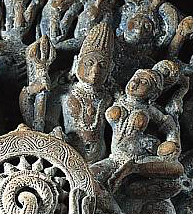 PrePanels 導讀座談 2010/10/09 2PM-5PM 政治大學研究大樓哲學基礎研究室 研讀文獻: 2.
Parimal G. Patil, Against a Hindu God, Chapter 6. (pdf)(鄧偉仁導讀) 2010/11/13 2PM-5PM 政治大學研究大樓哲學基礎研究室 研讀文獻: 1.
Lawrence J. McCrea and Parimal G. Patil, Buddhist Philosophy of Language in India, Introduction. (林恕安導讀) 2.
John Taber, "Mīmāṃsā and the Eternality of Language."(嚴瑋泓導讀) (閱讀材料請來信索取: buddhismstudy@yahoo.com.tw ) 2010/12/18 2PM-5PM 政治大學研究大樓哲學基礎研究室 研讀文獻: 2.
L. Schmithausen, "A Note on the Origin of Ahimsa." ( pdf ) Event 2011的論壇文章 [ 發表文章 ] [ 瀏覽文章 ] Event 2011的分類地圖 Developed by MEPO Humanity Technology - http://mepo.cc
|